李娜的英文介绍
- 格式:doc
- 大小:172.81 KB
- 文档页数:7

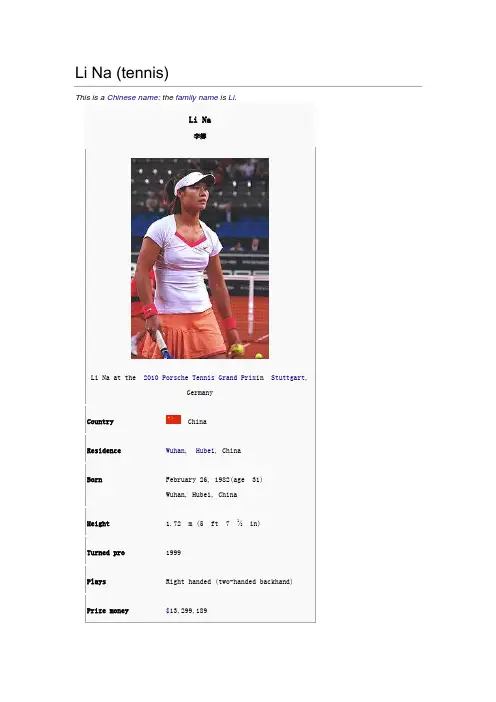
Li Na (tennis)This is a Chinese name; the family name is Li.Li Na李娜Li Na at the 2010 Porsche Tennis Grand Prix in Stuttgart, GermanyCountry ChinaResidence Wuhan, Hubei, ChinaBorn February 26, 1982(age 31)Wuhan, Hubei, ChinaHeight 1.72 m (5 ft 7 1⁄2 in)Turned pro 1999Plays Right handed (two-handed backhand)Prize money $13,299,189SinglesCareer record 475–181 (72.41%)Career titles 7 WTA, 19 ITFHighest ranking No. 3 (October 28, 2013) Current ranking No. 3 (October 28, 2013)Grand Slam Singles results Australian Open F (2011, 2013)French Open W (2011)Wimbledon QF (2006, 2010, 2013) US Open SF (2013)Other tournaments Championships F (2013)Olympic Games SF – 4th (2008)DoublesCareer record 121–50Career titles 2 WTA, 16 ITFHighest ranking No. 54 (August 28, 2006)Grand Slam Doubles results Australian Open2R (2006, 2007)French Open2R (2006, 2007) Wimbledon2R (2006)Li Na (Chinese: 李娜; pinyin: Lǐ Nà; born February 26, 1982) is a Chinese professional tennis player.As of September 2013, Li has won 7WTA and 19 ITF singles titles. Li rose to prominence after she won the2011 French Open singles title, making her the first and only Grand Slam singles champion from an Asian country. Prior to this Li had already become the first player representing an Asian country to appear in a Grand Slam singles final, a milestone she achieved at the2011 Australian Open. She was also the runner-up at the 2013 Australian Open, three times a quarter-finalistat Wimbledon and a semi-finalist at the 2013 US Open. Her career-high singles ranking is World No.3 (achieved on October 28, 2013) and is currently the World No. 3 and Chinese No. 1 (out of4 inthe top-100).[1]Contents[hide]∙ 1 Personal life∙ 2 Career summaryo 2.1 1999–2002: Dominance on the ITF Circuito 2.2 2004: Successful return to professional tenniso 2.3 2005o 2.4 2006: First Chinese Grand Slam quarterfinalisto 2.5 2007o 2.6 2008o 2.7 2009o 2.8 2010: First Grand Slam semifinal appearance and ascent to world's top teno 2.9 2011: Historic victory at Roland Garros followed by inconsistent resultso 2.10 2012o 2.11 2013: Return to top form∙ 3 Rivalrieso 3.1 Li vs. Sharapovao 3.2 Li vs. Radwańskao 3.3 Li vs. Clijsterso 3.4 Li vs. Azarenka∙ 4 Playing Style∙ 5 Career statisticso 5.1 Grand Slam finals▪ 5.1.1 Singles: 3 (1–2)o 5.2 Olympic games▪ 5.2.1 Singles: 1 Bronze Medal matcho 5.3 Grand Slam Singles performance timelineo 5.4 Grand Slam Doubles performance timeline∙ 6 Popularity and endorsements∙7 See also∙8 References∙9 External linksPersonal life[edit]Li Na was born on February 26, 1982, in Wuhan, Hubei, China. Her father Li Shengpeng (李盛鹏) was a professional badminton player and later worked as a sales rep for a Wuhan based company.He died from a rare cardiovascular disease when Li Na was 14.[2]At age six, Li Na started playing badminton, following her father's footsteps. Just before she turned eight, Li made the transition from badminton to tennis when she and her parents were convinced by coach Xia Xiyao of the Wuhan youth tennis club that this would be the right career move for her.[3] Li joined China's National Tennis Team in 1997. In the following year, Li, sponsored by Nike, went to John Newcombe Academy in Texas to study tennis.[4] She studied there for 10 months andreturned to China. Li turned professional in 1999 at age sixteen.At the end of 2002, Li left the national tennis team to study part-time at Huazhong University of Science and Technology, where she completed her bachelor's degree in journalism in 2009. The Chinese media cited various reasons for this. Some reported that the relationship between her and her teammate, future husband Jiang Shan (姜山), was opposed by the national team'smanagement,[5] some reported that her coach Yu Liqiao (余丽桥) was too strict anddemanding,[6]while other reports claimed that her request for a personal coach did not go through.[7] However, Li returned to the national team in 2004. Jiang Shan married Li on January 27, 2006 and became her personal coach. Li quit the national team[8] as well as the state-run sports system in 2008 under an experimental reform policy for tennis players. This change was called "Fly Alone" (单飞) by Chinese media.[9] As a result, Li had the freedom to pick her own coaching staff but she would be responsible for the cost of travel, training and coaching. She could keep more of her winnings,[10] with only 8 to 12 percent of her winnings go to the Chinese Tennis Association as opposed to 65 percent previously.[11]Li Na has a tattoo on her chest, and hid it for many years since tattoos are not widely accepted in China, especially on women.[12][13]Career summary[edit]1999–2002: Dominance on the ITF Circuit[edit]Li turned professional in 1999, and that year won three of the very first four singles tournaments she entered on the ITF Circuit, two at Shenzhen and one at Westende, Belgium. She also won all of her first seven ITF doubles tournaments she entered.In 2000, she won a total of 52 singles matches on the ITF circuit, more than any other player, notching another eight tournament titles including one at $50,000 level, two at $25,000, and an unbroken run of four successive $10,000 tournament wins in March and April.Notable individual victories in the course of the year included wins over FlaviaPennetta, Emmanuelle Gagliardi, Maria Elena Camerin, Tamarine Tanasugarn and Yayuk Basuki. In June, after Li's world ranking had risen to no. 136 on the strength of her ITF performances alone, she gained direct entry into her first WTA Tour event at Tashkent. Despite winning the first set, Li lost her first WTA singles match to Anna Zaporozhanova in three sets, but she captured the women's doubles title at Tashkent with Li Ting against Zaporozhanova and Iroda Tulyaganova.By the end of 2000, Li had won four WTA singles matches, this brought her cumulative ITF singles title count up to 11. That year, she also won seven more ITF doubles events, 6 of them with Li Ting. Li was mostly absent from the tour in 2001. She won two further $25,000 ITF singles tournaments, defeating Roberta Vinci in the final at Ho Chi Minh City, Vietnam, and Liu Nan-Nan in the final at Guangzhou in July, but then played only one further match for the rest of the year, leading her ranking to fall to no. 303 by the year's close.She won her 15th career ITF doubles tournament at Hangzhou in March.In 2002, she came through qualifying to win her first $75,000 singles tournament at Midland, USA in February, defeating Laura Granville, Tatiana Perebiynis, and Mashona Washington en route to the title, the 14th of her career. But she then played only one more match (a loss to ZuzanaOndrášková in the $50,000 event at Dinan, France that April), followed by a lengthy absence from the circuit for the next 25 months.Sources vary as to the causes of this absence, the Chinese media mostly cited the conflict between her and the China's National Tennis Team's administration and coaching staff.[5][6][7] Some claimed that she just wanted a break from professional tennis so she could concentrate on her studies at university.2004: Successful return to professional tennis[edit]In May 2004, Li returned to the competition after having not played since 2002. Although she was unranked, she won 26 successive matches to notch three further $25,000 tournament wins and another $50,000 title, increasing her career singles title count to 18, only to have her winning streak finally snapped by Evgenia Linetskaya in the semifinal of the $50,000 Bronx tournament that August. However, she won her 16th ITF doubles tournament at the same event, the 17th overall doubles title of her career.That September, she lost in the final of a $25,000 tournament to compatriot Zheng Jie, before returning to the WTA circuit, thanks to a wildcard entry into qualifying at the Beijing. There, she defeated Antonella Serra Zanetti, Marta Domachowska, and Nicole Pratt before losing in the deciding-set tie-break after a very close second-round main-draw tussle against newly crowned US Open Champion Svetlana Kuznetsova, during which she held match points against Kuznetsova. The Russian afterwards praised her Chinese opponent, stating that she had felt as though she was up against a top-5 player.The very next week, Li battled her way through qualifying into the WTA event at Guangzhou (a Tier IV event at the time, though since has been upgraded to Tier III), then beat Vera Dushevina, Jelena Janković, Kristina Brandi, and Li Ting in the main draw to reach the final, where sheovercame Martina Suchá to win her first WTA Tour title. By doing so, Li became the first Chinese tennis player to win a WTA event.On the back of the ranking points accrued through this result, on October 4, 2004, she broke into the WTA top 100 for the first time.To cap off her most successful year as a singles player yet, she competed in two $50,000 ITF tournaments at Shenzhen, winning the first outright to bring her the 19th ITF singles title and 20th overall singles title of her career, but losing in the quarterfinals of the second to lower-ranked country-woman Yan Zi. These results elevated Li Na to world no. 80 by the close of the year, a year in which she won 51 singles matches and lost just four.2005[edit]2005 saw Li finally abandoning the ITF circuit to focus solely on WTA-level events.She began the year with a second-round performance at Gold Coast and a semifinal showing at Hobart, but losing to fellow Chinese player and eventual tournament champion Zheng Jie. She then made her Grand Slam debut at the2005 Australian Open, advancing to the third round with wins over Laura Granville and Shinobu Asagoe before losing to Maria Sharapova.In early February, she reached the quarterfinals at Hyderabad and qualified for Doha where she was narrowly beaten by Patty Schnyder in the first round of the main draw. After a victory over Ai Sugiyama in the first round at Dubai the following week, it was Schnyder once again who stopped her from reaching the later stages of the event.After taking a month off from competition, Li returned at Estoril in late April, defeating Stéphanie Cohen-Aloro, Nicole Pratt, Dally Randriantefy, and then crushing Dinara Safina to reach her second WTA Tour final. Li was denied the title by Czech qualifier Lucie Šafářová, who prevailed in a close three-set match.At Rabat in May, Li reached the semifinal stage, but further success ultimately proved elusive for her. With the score leveled at 3–3, she retired due to a right ankle sprain while clashing with Zheng Jie. Reaching this semifinal propelled her to a career-high world ranking of no. 33, but the injury she had sustained was destined to keep her out of action for the next three months.On her return at Los Angeles in August, she fell in the first round to Anna Chakvetadze of Russia. The following week, however, at the Canadian Open, she once more beat JelenaJanković and María Vento-Kabchi, before losing to Nadia Petrova in the third round.It was Lindsay Davenport who proved her undoing in her next two tournaments, beating her in the first round of the US Open, and at the semifinal stage in Bali in September, but not before Li Na had avenged her previous year's defeat by Yan Zi in the second round of the same tournament.The following week, another highly ranked American player, Jill Craybas, narrowly defeated Li Na in a close three-set first-round match at Beijing.On September 26, Li Na commenced her defence of her Guangzhou title; but she was prevented from completing it in the quarterfinals by eventual champion Yan Zi, who thereby edged out in front in their head-to-head record once again. This second loss in three head-to-heads against Yan proved to be Li's last match of 2005; and in her absence from the Shenzhen $50,000 tournaments where she had notched up some ranking points late the previous year, she found herself slipping further in the rankings from the high-point of no. 33 that she had reached in the spring before her injury break, to no. 56 at the year's close.2006: First Chinese Grand Slam quarterfinalist[edit]With nearly all her remaining ranking points to defend concentrated in a little over the first four months of the year, Li Na began the year faced with the challenge of equalling her strong resultsfrom the early part of 2005 in order to maintain her position in the middle reaches of the WTA top 100.Early-round draws against high-ranked players towards the beginning of 2006 took a heavy toll on Li's singles ranking, bringing it slipping down to no. 71 by the end of February.She returned with a career-best performance at Tier I events by reaching the semifinal at Berlin. On the way there, she achieved her first victory over a current top-10-ranked player as sheousted Patty Schnyder for the first time at the quarterfinal stage. However, this match left her with a muscle sprain, and she lost to Nadia Petrova in the semifinal. Nonetheless, her performance at this high-level tournament saw her ranked no. 39.Joining the WTA grass-court season for the first time at the DFS Classic tournament at Birmingham in June, she managed another third-round finish with wins over Mashona Washington andgrass-court specialist Eleni Daniilidou, both in straight sets, then lost for the third time in three meetings to Maria Sharapova. Her ranking following this tournament was no. 30, which was at that time the highest ever ranking achieved by a Chinese woman.At the same event, partnering Jelena Janković, she notched up her second career WTA doubles title, almost exactly six years from her first at Tashkent.An early retirement against Alona Bondarenko in the first round of the Ondina Open at's-Hertogenbosch the following week curtailed her final competitive preparations for her debut appearance at Wimbledon. But with an entry ranking of 30th, she found herself seeded 27th after some withdrawals, and thus achieved another first for her country in becoming the first Chinese woman ever to be seeded for entry into a Grand Slam tournament.At Wimbledon, she reached the fourth round with comfortable straight-sets wins over respected grass-court players Virginie Razzano and recent Birmingham semifinalist Meilen Tu, followed by victory against 10th seeded Svetlana Kuznetsova, resulting in her being the first Chinese player ever to reach any Grand Slam quarterfinal. Li rose to a new career high WTA ranking of no. 20 following the tournament, even though she ultimately lost her quarterfinal match against Kim Clijsters in two close sets.She reached the quarterfinals at Stockholm, and the fourth round at the US Open, where, as the 24th seed, she was beaten by eventual champion Maria Sharapova in two sets. She then reached the quarterfinals at the China Open, where she was beaten by Svetlana Kuznetsova, and in Guangzhou.2007[edit]Li Na at 2008 Fortis Championships LuxembourgLi Na started the year by participating a Tier III event in Gold Coast, Australia, where she reached the second round. The next week, she competed in Sydney. She defeated Francesca Schiavone in the first round, Elena Dementieva in the second, saving five match points, and KatarinaSrebotnik in the quarterfinal. Then, she made it to the semifinals, losing a tough match to Kim Clijsters, 5–7 in the third set. However, she rose to a career high of no.16 afterwards.Li Na followed her strong showing at the Medibank tournament with an equally strong showing at the 2007 Australian Open, where she advanced to the fourth round. Seeded 19th, Lidispatched Elena Bovina and Lourdes Domínguez Lino in straight sets through the first two rounds, leading to a matchup with no. 9 Dinara Safina. The match was postponed due to rain, but Li handedly beat Safina to advance to the fourth round to play Swiss star, no. 6 Martina Hingis. Due to a rain delay and the fact that Hingis played on Rod Laver Arena, a roofed court, on the originally scheduled day, Hingis had an extra day of rest. The match the previous day seemed to have no effect, as Li took the first set from Hingis. However, Na faded as the match went on and lost while committing 69 unforced errors. Despite the loss, the tournament was a success for Na, as it marked the third straight time in a Grand Slam that she advanced at least to the fourth round.At the Tier I Pan Pacific Open in Tokyo, Japan, Li advanced to the second round, defeating Lilia Osterloh before losing to Samantha Stosur in two sets, converting 0 of 11 break points.At the important Pacific Life Open in Indian Wells, California, Li made a strong showing, advancing to the semifinals. She lost to Daniela Hantuchová in the semifinal. She continued her good form at the Miami Masters, losing just three games in her first two matches against TamiraPaszek and Katarina Srebotnik, before stunning fourth-seeded Kim Clijsters in three sets. She then lost in the quarterfinals to Anna Chakvetadze.She then moved onto the green clay of Amelia Island, where she suffered a shock second-round exit, after receiving a first round bye, to former top-20 player Karolina Šprem in straight sets. Atthe Family Circle Cup held in Charleston, South Carolina, she fell in the third round to Anabel Medina Garrigues.After losing in a grass tune-up event in Birmingham, Li pulled out of every tournament she was to play in the summer, including Wimbledon and the US Open, citing a rib injury.2008[edit]Li Na at the 2008 Wimbledon Championships.Li Na had not played a professional match in half a year and had resultantly slipped to no. 29 in the WTA rankings when she returned from her rib injury in January 2008 to compete at the 2008 Mondial Australian Women's Hardcourts in Gold Coast, Australia. In the first round, she narrowly defeated seventh seed Sybille Bammer. After a comfortable second round victoryover wildcard Monique Adamczak, she was drawn to meet the top seed Nicole Vaidišová in the quarterfinals. Li won their encounter in straight sets, advancing to the semifinals, where she edged past Patty Schnyder.[14] In the final, she narrowly prevailed against Victoria Azarenka, not only ending her 3-year title drought (since Guangzhou 2004) but scoring her second WTA singles title of her career.Despite rising back up to world no. 24 following this victory, she then withdrew from the 2008 Medibank International in Sydney, after suffering a right knee injury. Her failure to defend her previous year's semifinal performance at this event cost her 125 ranking points, which dipped her ranking back down to no. 30 for the week beginning 14 January.Going into the 2008 Australian Open, she had a further 140 ranking points to defend from her fourth-round performance in 2007. Faced with a relatively lenient draw in the early rounds, she survived a close three-set tussle with Séverine Brémond in the first round, before surpassing Maria Elena Camerin in straight sets in round two. A revitalised Marta Domachowska remained between her and the defence of her ranking points, and although Li Na won the first set convincingly, shefaltered thereafter and finally ceded the match to her Polish opponent by a single break of serve in the closely fought deciding set.Having slipped three places to world no. 33 by the time she entered the Tier II tournamentat Antwerp in early February, she nonetheless progressed to the semifinals withback-to-back-to-back straight-sets wins over Russian veteran Elena Likhovtseva, Slovak world no.45 Dominika Cibulková, and on-form Swedish world no. 66Sofia Arvidsson. However, she withered in the semifinals against world no. 47 Karin Knapp, despite having taken an early lead with a break of service in the first set, ultimately ceding the match to her Italian opponent in two sets. This tournament brought her back up within the top 30 at world no. 29.The next week in the Tier I 2008 Qatar Total Open, Li met Likhovtseva again in the first round. This time, after taking the first set comfortably, she was challenged to a much tougher battle, but eventually won in three sets. In round 2, she scored her second straight-sets victory in four career head-to-heads against Russian world no. 6 Anna Chakvetadze (whom she had last beaten at the French Open in 2005), saving a set point in the first set tie-break, before recovering to win. In the third round, she enjoyed a more comfortable victory over Israeli world no. 17 Shahar Pe'er, recovering from a 1–3 deficit in the second set. In the quarterfinals, she met her old rival and friend world no. 4 Jelena Janković, coming into the match with a winning 3–1 head-to-head record to her credit against the Serbian player. By defeating Janković she extended this record to 4:1 and moved into the semifinals, where she played Vera Zvonareva, against whom she had won both of her previous encounters. Despite taking the first set, Li lost the second by the same scoreline; and although she was 3–2 up in the final set, she then ceded four successive games to her opponent to lose the match.Her ranking having risen back to no. 23 on the strength of this performance, she was prevented from consolidating on this recovery by suffering a right knee injury, which forced her to pull out of her scheduled entries into both the Tier II event at Bangalore in early March and the Tier I tournament at Indian Wells in the middle of the month. She returned to action at the International Women's Open in Eastbourne, winning one round before losing to Nadia Petrova. She then contested Wimbledon, defeating Anastasia Rodionova before losing to Anastasia Pavlyuchenkova. At the Beijing Olympics, following early-round victories against world no. 3 Svetlana Kuznetsova, Ayumi Morita, and Kaia Kanepi, she went on to defeat one of the favourites, Venus Williams, in the quarterfinals. Li was trailing 1–4 in the first set, but managed to strengthen her game to win in straight sets. Li lost her semifinal match to sixth seed Dinara Safina and was then defeated in the bronze final by Vera Zvonareva. At the following US Open, Li was defeated by the Beijing Olympics gold medalist Elena Dementieva in the fourth round.In the 2008 Porsche Grand Prix, the unseeded Li defeated no. 1 ranked Serena Williams in the second round in three sets. Li thus became only the second Chinese player to defeat a world no. 1 player, following Zheng Jie's victory over Ana Ivanovic at Wimbledon in 2008.2009[edit]Li Na at the 2009 US OpenLi withdrew from both the inaugural Brisbane International, where she was defending champion (as she won the title at Gold Coast in 2008), and the Australian Open because of a right-knee injury. She made her comeback at the Paris Open. In the first round, she beat Ágnes Szávay, but in the second round she lost to second-seeded Jelena Janković.In the first round of the Barclays Dubai Tennis Championships, Li lost to Russian Elena Vesnina in three sets.Unseeded at the Monterrey Open, she defeated world no. 10 and top seed AgnieszkaRadwańska in a first round match that lasted over two hours. In the second round, she beat Petra Cetkovská and then advanced to the semifinals after defeating Lucie Šafářová. Li then moved into her fifth career tour final, after beating sixth-seeded Iveta Benešová. However, Li lost tosecond-seeded Marion Bartoli in the final in straight sets.Li then played in the Premier event at Indian Wells, where she defeated TamarineTanasugarn, Patty Schnyder, and Amélie Mauresmo, all in straight sets, to advance to the fourth round, where she lost to eventual champion Vera Zvonareva.She then reached the quarterfinals of the Premier event in Miami, where she beat qualifier Urszula Radwańska in the first round and upset 29th seed Aleksandra Wozniak to reach the third round, where she caused a big upset by defeating the previous week's Indian Wells champion,6th-seeded Vera Zvonareva in three sets. This victory was particularly important for Li, as she had been beaten by Zvonareva the week before at Indian Wells. She then faced unseededRussian Ekaterina Makarova in the fourth round and beat her in three sets to set up a quarterfinal match with the top seed and world no. 1 Serena Williams, a match which she lost in a tightthree-setter. Because of her strong performance, her ranking went up to world no. 29 from world no.40.Na's next event was the second Grand Slam of the year, the French Open in Paris. As the 25th seed, she won her first round against Polish Marta Domachowska. She then defeated TimeaBacsinszky and Olga Govortsova. She then lost to unseeded, former world no. 1 Maria Sharapova in the fourth round. After this impressive result, she jumped six rankings up to no. 20. She started her grass-court season as the fourth seed at the Aegon Classic in Birmingham and advanced to the final with a win over Maria Sharapova in the semifinals. However, Na was defeated by Magdaléna Rybáriková in the final.Na was seeded 19th at the 2009 Wimbledon Championships. She defeated Galina Voskoboeva in the first round and Olga Govortsova in the second round, but lost to no. 11 Agnieszka Radwańska in the third round.At the 2009 Bank of the West Classic, she lost to Serena Williams in the first round, and at the 2009 LA Women's Tennis Championships p/b Herbalife, she withdrew due to injury during her match with Urszula Radwańska of Poland.Seeded 18th at the 2009 US Open, she reached her first US Open quarterfinals, where she lost to eventual champion Kim Clijsters. En route to the quarterfinals, she defeated Ioana RalucaOlaru, Michelle Larcher de Brito, Maria Kirilenko, and Francesca Schiavone all in straight sets. Seeded 15th at the Toray Pan Pacific Open, Li Na won her opening match against Alizé Cornet. She then defeated Vera Dushevina before beating Kateryna Bondarenko. In the quarterfinal, she defeated Victoria Azarenka in three sets, two of which were tiebreaks where though she failed in serving for the match twice in the last set. Li lost in the semifinals to Jelena Janković.Li finished the year at world no. 15, her career-high year-end ranking.2010: First Grand Slam semifinal appearance and ascent to world's top ten[edit]Li Na at the 2010 Stuttgart Porsche Grand PrixLi's first tournament of 2010 was the 2010 ASB Classic in Auckland, where she was seeded second. She was defeated by Kaia Kanepi in the first round. In the Medibank International, she defeated fourth seed Caroline Wozniacki but lost to Flavia Pennetta in the second round.Li was seeded 16th at the 2010 Australian Open. She defeated world no. 4Caroline Wozniacki in the fourth round and then came from a set and 3–5 down to defeat world no. 6 Venus Williams, inher first Australian Open quarterfinal and only her third Major quarterfinal. In the semifinals, she lost to Serena Williams in two highly competitive tiebreaks. As a result of this performance, Li was the first Chinese woman ever to be ranked in the top 10 of women's professional tennis.At the Barclays Dubai Tennis Championships, Li, the eighth seed, defeated María José MartínezSánchez in the second round. She then came from a 6–3 5–2 deficit to defeat Marion Bartoli in the third round. Li was forced to retire in her quarterfinals match against Shahar Pe'er.Li continued her season at the inaugural Malaysian Open. As second seed, she fell to Tatjana Malek in the first round. As seventh seed at the 2010 BNP Paribas Open, Li fell to ElenaBaltacha in the second round. Li was 8th seed at the 2010 Sony Ericsson Open, but fell to Timea Bacsinszky in the second round.At the 2010 Porsche Tennis Grand Prix, Li defeated defending champion Svetlana Kuznetsova in the second round, before falling to eventual runner-up Sam Stosur in the quarterfinals. Li was 11th seed at the 2010 French Open. She fell to eventual champion and world no. 17 Francesca Schiavone in the third round.Li was seeded first at the 2010 Aegon Classic. She defeated 4th seed Aravane Rezaï in the semifinals, and 2nd seeded Maria Sharapova in the final to win the tournament. With the win, Li returned to the top 10 in the WTA rankings.Seeded seventh at the 2010 Aegon International, Li retired in the first round with a knee injury after winning the first set against Elena Baltacha.Li was seeded ninth at Wimbledon. She defeated seventh seed Agnieszka Radwańska to advance to the quarterfinals at Wimbledon for the second time in her career, where she lost to world no. 1 and defending champion Serena Williams. By going into the last eight, Li once again returned to the top 10 in the WTA rankings.At the 2010 US Open, she started off as the eighth seed, but fell at the first hurdle to Kateryna Bondarenko.Li was an alternate at the 2010 WTA Tour Championships, but did not receive a chance to play. Instead, she played at the 2010 WTA Tournament of Champions as the first seed. However she was defeated by Japanese Kimiko Date-Krumm in the first round, thus putting an end to her 2010 season, which has been her best season to date.At the end of the year, Li's coach Thomas Högstedt chose to leave her in order to coach Maria Sharapova.2011: Historic victory at Roland Garros followed by inconsistent results[edit]。
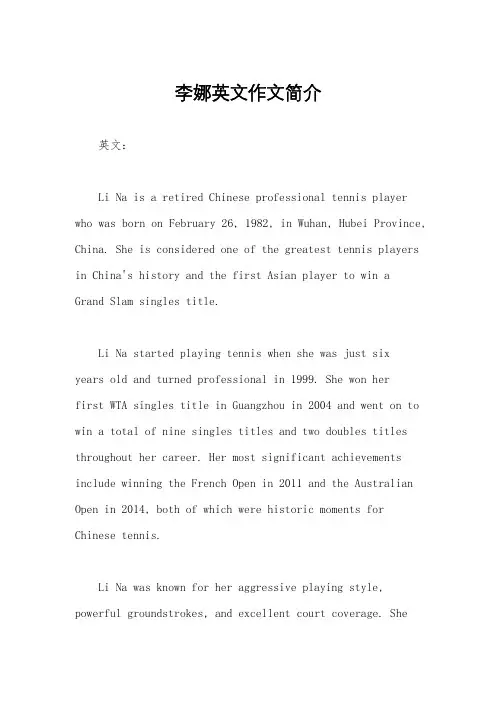
李娜英文作文简介英文:Li Na is a retired Chinese professional tennis player who was born on February 26, 1982, in Wuhan, Hubei Province, China. She is considered one of the greatest tennis players in China's history and the first Asian player to win a Grand Slam singles title.Li Na started playing tennis when she was just sixyears old and turned professional in 1999. She won herfirst WTA singles title in Guangzhou in 2004 and went on to win a total of nine singles titles and two doubles titles throughout her career. Her most significant achievements include winning the French Open in 2011 and the Australian Open in 2014, both of which were historic moments for Chinese tennis.Li Na was known for her aggressive playing style, powerful groundstrokes, and excellent court coverage. Shewas also famous for her humorous and outspoken personality, which made her a fan favorite worldwide. Her success in tennis has had a significant impact on the sport's popularity in China and has inspired many young players to pursue a career in tennis.中文:李娜是一位退役的中国职业网球选手,出生于1982年2月26日,中国湖北省武汉市。



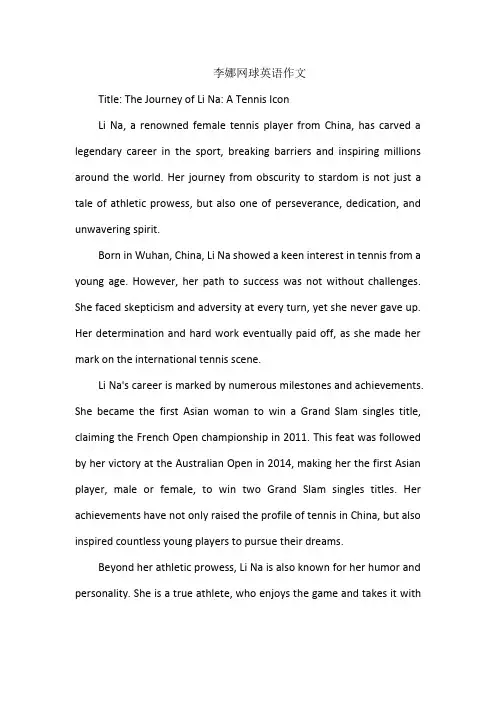
李娜网球英语作文Title: The Journey of Li Na: A Tennis IconLi Na, a renowned female tennis player from China, has carved a legendary career in the sport, breaking barriers and inspiring millions around the world. Her journey from obscurity to stardom is not just a tale of athletic prowess, but also one of perseverance, dedication, and unwavering spirit.Born in Wuhan, China, Li Na showed a keen interest in tennis from a young age. However, her path to success was not without challenges. She faced skepticism and adversity at every turn, yet she never gave up. Her determination and hard work eventually paid off, as she made her mark on the international tennis scene.Li Na's career is marked by numerous milestones and achievements. She became the first Asian woman to win a Grand Slam singles title, claiming the French Open championship in 2011. This feat was followed by her victory at the Australian Open in 2014, making her the first Asian player, male or female, to win two Grand Slam singles titles. Her achievements have not only raised the profile of tennis in China, but also inspired countless young players to pursue their dreams.Beyond her athletic prowess, Li Na is also known for her humor and personality. She is a true athlete, who enjoys the game and takes it witha light heart. Her sense of humor and down-to-earth personality have endeared her to fans across the globe.Li Na's journey in tennis has been remarkable, but her impact is far-reaching. She has broken barriers for Asian athletes, paving the way for future generations. Her story serves as a powerful reminder that hard work, dedication, and perseverance can overcome any obstacle. Li Na's legacy will continue to inspire young players and fans alike, for many years to come.。
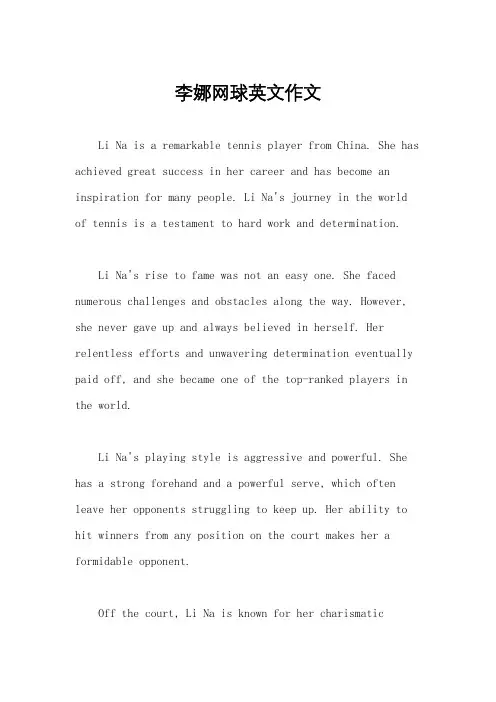
李娜网球英文作文Li Na is a remarkable tennis player from China. She has achieved great success in her career and has become an inspiration for many people. Li Na's journey in the world of tennis is a testament to hard work and determination.Li Na's rise to fame was not an easy one. She faced numerous challenges and obstacles along the way. However, she never gave up and always believed in herself. Her relentless efforts and unwavering determination eventually paid off, and she became one of the top-ranked players in the world.Li Na's playing style is aggressive and powerful. She has a strong forehand and a powerful serve, which often leave her opponents struggling to keep up. Her ability to hit winners from any position on the court makes her a formidable opponent.Off the court, Li Na is known for her charismaticpersonality and sense of humor. She always manages to bring a smile to the faces of her fans with her witty remarks and funny anecdotes. Her down-to-earth nature and approachability have made her a fan favorite both in China and around the world.Li Na's success has not only brought her personal fame and fortune but has also helped to popularize tennis in China. She has inspired a whole generation of young Chinese players to take up the sport and pursue their dreams. Her success has also opened doors for other Asian players, showing that they too can compete at the highest level.Despite retiring from professional tennis, Li Na continues to make a significant impact on the sport. She is actively involved in promoting tennis in China and has established her own tennis academy to nurture young talent. Her dedication to the sport and her desire to give back to the community are truly commendable.In conclusion, Li Na is a true champion both on and off the court. Her remarkable journey and achievements havemade her a role model for aspiring tennis players around the world. Her impact on the sport and her ability to inspire others will always be remembered.。
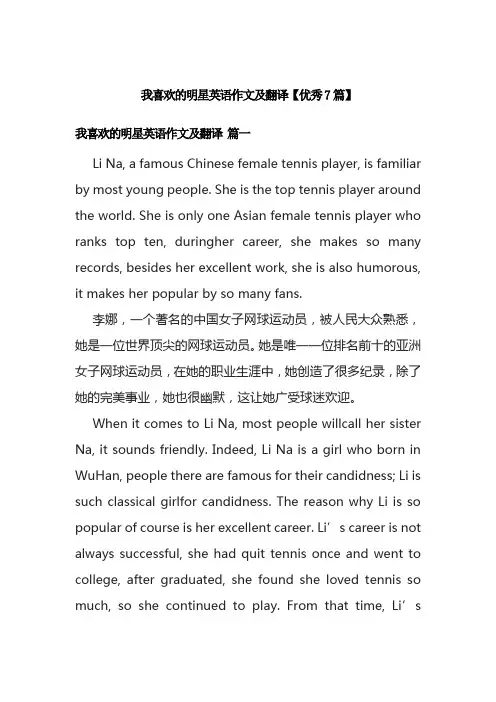
我喜欢的明星英语作文及翻译【优秀7篇】我喜欢的明星英语作文及翻译篇一Li Na, a famous Chinese female tennis player, is familiar by most young people. She is the top tennis player around the world. She is only one Asian female tennis player who ranks top ten, duringher career, she makes so many records, besides her excellent work, she is also humorous, it makes her popular by so many fans.李娜,一个著名的中国女子网球运动员,被人民大众熟悉,她是一位世界顶尖的网球运动员。
她是唯一一位排名前十的亚洲女子网球运动员,在她的职业生涯中,她创造了很多纪录,除了她的完美事业,她也很幽默,这让她广受球迷欢迎。
When it comes to Li Na, most people willcall her sister Na, it sounds friendly. Indeed, Li Na is a girl who born in WuHan, people there are famous for their candidness; Li is such classical girlfor candidness. The reason why Li is so popular of course is her excellent career. Li’s career is not always successful, she had quit tennis once and went to college, after graduated, she found she loved tennis so much, so she continued to play. From that time, Li’scareer has really started, she plays sowell, she becomes the first Chinese tennis player who rank top ten, the first player to win French Open…The records she makes are far from counting, she inspires so many teenagers to work on tennis career.当谈到李娜的`时候,大部分人会称她为娜姐,这听起来很友好。
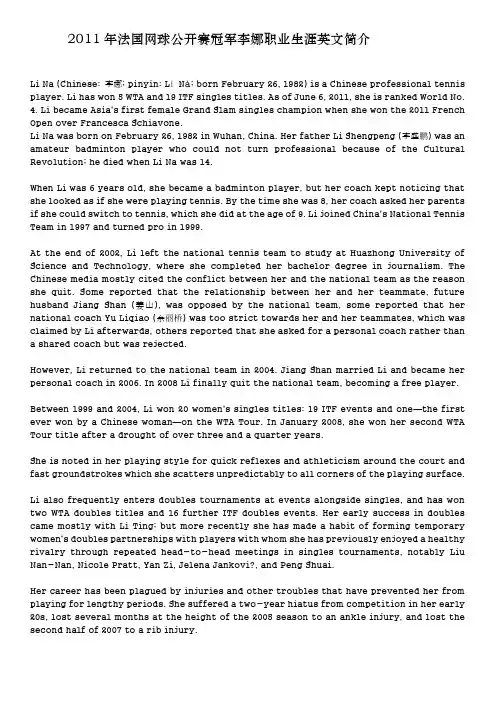
2011年法国网球公开赛冠军李娜职业生涯英文简介Li Na (Chinese: 李娜; pinyin: LǐNà; born February 26, 1982) is a Chinese professional tennis player. Li has won 5 WTA and 19 ITF singles titles. As of June 6, 2011, she is ranked World No.4. Li became Asia's first female Grand Slam singles champion when she won the 2011 French Open over Francesca Schiavone.Li Na was born on February 26, 1982 in Wuhan, China. Her father Li Shengpeng (李盛鹏) was an amateur badminton player who could not turn professional because of the Cultural Revolution; he died when Li Na was 14.When Li was 6 years old, she became a badminton player, but her coach kept noticing that she looked as if she were playing tennis. By the time she was 8, her coach asked her parents if she could switch to tennis, which she did at the age of 9. Li joined China's National Tennis Team in 1997 and turned pro in 1999.At the end of 2002, Li left the national tennis team to study at Huazhong University of Science and Technology, where she completed her bachelor degree in journalism. The Chinese media mostly cited the conflict between her and the national team as the reason she quit. Some reported that the relationship between her and her teammate, future husband Jiang Shan (姜山), was opposed by the national team, some reported that her national coach Yu Liqiao (余丽桥) was too strict towards her and her teammates, which was claimed by Li afterwards, others reported that she asked for a personal coach rather than a shared coach but was rejected.However, Li returned to the national team in 2004. Jiang Shan married Li and became her personal coach in 2006. In 2008 Li finally quit the national team, becoming a free player.Between 1999 and 2004, Li won 20 women's singles titles: 19 ITF events and one—the first ever won by a Chinese woman—on the WTA Tour. In January 2008, she won her second WTA Tour title after a drought of over three and a quarter years.She is noted in her playing style for quick reflexes and athleticism around the court and fast groundstrokes which she scatters unpredictably to all corners of the playing surface.Li also frequently enters doubles tournaments at events alongside singles, and has won two WTA doubles titles and 16 further ITF doubles events. Her early success in doubles came mostly with Li Ting; but more recently she has made a habit of forming temporary women's doubles partnerships with players with whom she has previously enjoyed a healthy rivalry through repeated head-to-head meetings in singles tournaments, notably Liu Nan-Nan, Nicole Pratt, Yan Zi, Jelena Jankovi?, and Peng Shuai.Her career has been plagued by injuries and other troubles that have prevented her from playing for lengthy periods. She suffered a two-year hiatus from competition in her early 20s, lost several months at the height of the 2005 season to an ankle injury, and lost the second half of 2007 to a rib injury.2011年法网冠军李娜职业生涯中文介绍李娜(1982年2月26日-),有史以来最成功的中国职业网球选手,2011年法国网球公开赛女单冠军,亦是中国第一个单打世界排名前十的网球选手,截止2011年5月23日,她的WTA官方排名为第7。
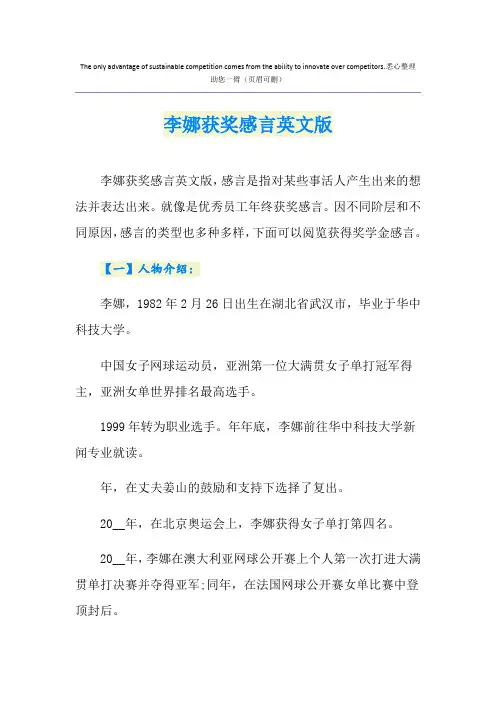
The only advantage of sustainable competition comes from the ability to innovate over competitors.悉心整理助您一臂(页眉可删)李娜获奖感言英文版李娜获奖感言英文版,感言是指对某些事活人产生出来的想法并表达出来。
就像是优秀员工年终获奖感言。
因不同阶层和不同原因,感言的类型也多种多样,下面可以阅览获得奖学金感言。
【一】人物介绍:李娜,1982年2月26日出生在湖北省武汉市,毕业于华中科技大学。
中国女子网球运动员,亚洲第一位大满贯女子单打冠军得主,亚洲女单世界排名最高选手。
1999年转为职业选手。
年年底,李娜前往华中科技大学新闻专业就读。
年,在丈夫姜山的鼓励和支持下选择了复出。
20__年,在北京奥运会上,李娜获得女子单打第四名。
20__年,李娜在澳大利亚网球公开赛上个人第一次打进大满贯单打决赛并夺得亚军;同年,在法国网球公开赛女单比赛中登顶封后。
20__年,在WTA年终总决赛中获得亚军。
20__年1月25日,第三次跻身澳大利亚网球公开赛决赛并最终收获女单冠军。
20__年9月18日,李娜正式宣布退役。
12月15日,被英国《金融时报》评选为年度女性人物。
20__年2月1日,李娜获“20__年CCTV体坛风云人物年度评选”的`年度最佳女运动员。
4月15日,李娜获得劳伦斯世界体育奖“特别成就奖”。
【二】获奖原因:我国女网球运动员李娜在备受关注的本年度法国网球公开赛的女单决赛中,战胜卫冕冠军、意大利名将斯齐亚沃尼,成为第一个捧起网球大满贯赛单打冠军的亚洲选手。
毫无疑问,凭借本场胜利,李娜改写了世界网坛历史,亚洲人为之欢欣,中国人更为之自豪。
我从内心钦佩李娜的勇敢、顽强和高超的技艺,并高度赞赏她取得的卓越成就。
【三】获奖感言:After the match, Li describes the process admits: "You know, I always gave her a lot of pressure, though she hasfighting back, but I finally succeeded." Asked about the motherland, the mood at the moment guess what, the Na said: "Everyone will be very excited, they have been supporting me." "Although I was nervous, but I do not want competitors to know. So I am very deceptive." Subsequently, China Jinhua laugh: "This is great fifteen days. "and also praised the Asian rivals a sister:" Her performance today deserve this championship. "runner-up veteran Schiavone of Italy took the lead on to the stage, she first expressed congratulations on the Li : "Today is very difficult, first of all congratulate Li, because she grew too fast this year, played great today and enjoy myself in it." Then she did not forget to thank the tournament organizers and the audience for each to . Subsequently, the Asia so far the only Grand Slam singles titles Lina Deng to speak Taiwanese, sent her quite general style of the Italian veteran and friend of the blessing: "Congratulations Schiavone had a wonderful two weeks." Immediately, Li went on to say thanks: "Thank you, sponsors, organizers and caddies Thank you, thank my team." At this point, Li Na of Hubei, then suddenly said "Happy Birthday" and then she explained that it wasgiven to one of his friends in Hubei. Finally, Li stressed: "Thank you all, I think next year I will come."。
全运会球员介绍英文作文英文:As a sports enthusiast, I am thrilled to introduce some of the talented athletes who will be participating in the National Games. These athletes have worked hard to earntheir spot on their respective teams and are ready to showcase their skills on the national stage.First up, we have Li Na, a tennis player from Jiangsu province. Li Na is a former world No. 2 and has won two Grand Slam singles titles. She is known for her powerful forehand and aggressive playing style. I am excited to see her compete at the National Games.Next, we have Zhang Jike, a table tennis player from Shandong province. Zhang Jike is a two-time Olympic gold medalist and has won numerous other international titles.He is known for his quick reflexes and powerful backhand. I am sure he will be a strong contender at the National Games.Finally, we have Liu Xiang, a track and field athlete from Shanghai. Liu Xiang is a former Olympic gold medalist and world record holder in the 110-meter hurdles. He is known for his explosive speed and precise technique. I am looking forward to seeing him compete at the National Games.中文:作为一名体育爱好者,我很高兴向大家介绍一些即将参加全运会的优秀运动员。
Li Na (tennis)This is a Chinese name; the family name is Li.Li Na (Chinese: 李娜; pinyin: Lǐ Nà; born February 26, 1982) is a Chinese professional tennis player. As of September 2013, Li has won 7WTA and 19 ITF singles titles. Li rose to prominence after she won the2011 French Open singles title, making her the first and only Grand Slam singles champion from an Asian country. Prior to this Li had already become the first player representing an Asian country to appear in a Grand Slam singles final, a milestone she achieved at the2011 Australian Open. She was also the runner-up at the 2013 Australian Open, three times a quarter-finalistat Wimbledon and a semi-finalist at the 2013 US Open. Her career-high singles ranking is World No.3 (achieved on October 28, 2013) and is currently the World No. 3 and Chinese No. 1 (out of4 in the top-100).[1]Personal life[edit]Li Na was born on February 26, 1982, in Wuhan, Hubei, China. Her father Li Shengpeng (李盛鹏) was a professional badminton player and later worked as a sales rep for a Wuhan based company. He died from a rare cardiovascular disease when Li Na was 14.[2]At age six, Li Na started playing badminton, following her father's footsteps. Just before she turned eight, Li made the transition from badminton to tennis when she and her parents were convinced by coach Xia Xiyao of the Wuhan youth tennis club that this would be the right career move for her.[3] Li joined China's National Tennis Team in 1997. In the following year, Li, sponsored by Nike, went to John Newcombe Academy in Texas to study tennis.[4] She studied there for 10 months and returned to China. Li turned professional in 1999 at age sixteen.At the end of 2002, Li left the national tennis team to study part-time at Huazhong University of Science and Technology, where she completed her bachelor's degree in journalism in 2009. The Chinese media cited various reasons for this. Some reported that the relationship between her and her teammate, future husband Jiang Shan (姜山), was opposed by the national team's management,[5] some reported that her coach Yu Liqiao (余丽桥) was too strict anddemanding,[6]while other reports claimed that her request for a personal coach did not go through.[7] However, Li returned to the national team in 2004. Jiang Shan married Li on January 27, 2006 and became her personal coach. Li quit the national team[8] as well as the state-run sports system in 2008 under an experimental reform policy for tennis players. This change was called "Fly Alone" (单飞) by Chinese media.[9] As a result, Li had the freedom to pick her own coaching staff but she would be responsible for the cost of travel, training and coaching. She could keep more of her winnings,[10] with only 8 to 12 percent of her winnings go to the Chinese Tennis Association as opposed to 65 percent previously.[11]Li Na has a tattoo on her chest, and hid it for many years since tattoos are not widely accepted in China, especially on women.[12][13]Career summary[edit]1999–2002: Dominance on the ITF Circuit[edit]Li turned professional in 1999, and that year won three of the very first four singles tournaments she entered on the ITF Circuit, two at Shenzhen and one at Westende, Belgium. She also won all of her first seven ITF doubles tournaments she entered.In 2000, she won a total of 52 singles matches on the ITF circuit, more than any other player, notching another eight tournament titles including one at $50,000 level, two at $25,000, and an unbroken run of four successive $10,000 tournament wins in March and April.Notable individual victories in the course of the year included wins over FlaviaPennetta, Emmanuelle Gagliardi, Maria Elena Camerin, Tamarine Tanasugarn and Yayuk Basuki. In June, after Li's world ranking had risen to no. 136 on the strength of her ITF performances alone, she gained direct entry into her first WTA Tour event at Tashkent. Despite winning the first set, Li lost her first WTA singles match to Anna Zaporozhanova in three sets, but she captured the women's doubles title at Tashkent with Li Ting against Zaporozhanova and Iroda Tulyaganova.By the end of 2000, Li had won four WTA singles matches, this brought her cumulative ITF singles title count up to 11. That year, she also won seven more ITF doubles events, 6 of them with Li Ting. Li was mostly absent from the tour in 2001. She won two further $25,000 ITF singles tournaments, defeating Roberta Vinci in the final at Ho Chi Minh City, Vietnam, and Liu Nan-Nan in the final at Guangzhou in July, but then played only one further match for the rest of the year, leading her ranking to fall to no. 303 by the year's close.She won her 15th career ITF doubles tournament at Hangzhou in March.In 2002, she came through qualifying to win her first $75,000 singles tournament at Midland, USA in February, defeating Laura Granville, Tatiana Perebiynis, and Mashona Washington en route to the title, the 14th of her career. But she then played only one more match (a loss to ZuzanaOndrášková in the $50,000 event at Dinan, France that April), followed by a lengthy absence from the circuit for the next 25 months.Sources vary as to the causes of this absence, the Chinese media mostly cited the conflict between her and the China's National Tennis Team's administration and coaching staff.[5][6][7] Some claimed that she just wanted a break from professional tennis so she could concentrate on her studies at university.2004: Successful return to professional tennis[edit]In May 2004, Li returned to the competition after having not played since 2002. Although she was unranked, she won 26 successive matches to notch three further $25,000 tournament wins and another $50,000 title, increasing her career singles title count to 18, only to have her winning streak finally snapped by Evgenia Linetskaya in the semifinal of the $50,000 Bronx tournament that August. However, she won her 16th ITF doubles tournament at the same event, the 17th overall doubles title of her career.That September, she lost in the final of a $25,000 tournament to compatriot Zheng Jie, before returning to the WTA circuit, thanks to a wildcard entry into qualifying at the Beijing. There, she defeated Antonella Serra Zanetti, Marta Domachowska, and Nicole Pratt before losing in the deciding-set tie-break after a very close second-round main-draw tussle against newly crowned US Open Champion Svetlana Kuznetsova, during which she held match points against Kuznetsova. The Russian afterwards praised her Chinese opponent, stating that she had felt as though she was up against a top-5 player.The very next week, Li battled her way through qualifying into the WTA event at Guangzhou (a Tier IV event at the time, though since has been upgraded to Tier III), then beat Vera Dushevina, Jelena Janković, Kristina Brandi, and Li Ting in the main draw to reach the final, where sheovercame Martina Suchá to win her first WTA Tour title. By doing so, Li became the first Chinese tennis player to win a WTA event.On the back of the ranking points accrued through this result, on October 4, 2004, she broke into the WTA top 100 for the first time.To cap off her most successful year as a singles player yet, she competed in two $50,000 ITF tournaments at Shenzhen, winning the first outright to bring her the 19th ITF singles title and 20th overall singles title of her career, but losing in the quarterfinals of the second to lower-ranked country-woman Yan Zi. These results elevated Li Na to world no. 80 by the close of the year, a year in which she won 51 singles matches and lost just four.2008[edit]Li Na had not played a professional match in half a year and had resultantly slipped to no. 29 in the WTA rankings when she returned from her rib injury in January 2008 to compete at the 2008 Mondial Australian Women's Hardcourts in Gold Coast, Australia. In the first round, she narrowly defeated seventh seed Sybille Bammer. After a comfortable second round victoryover wildcard Monique Adamczak, she was drawn to meet the top seed Nicole Vaidišová in the quarterfinals. Li won their encounter in straight sets, advancing to the semifinals, where she edged past Patty Schnyder.[14] In the final, she narrowly prevailed against Victoria Azarenka, not only ending her 3-year title drought (since Guangzhou 2004) but scoring her second WTA singles title of her career.Despite rising back up to world no. 24 following this victory, she then withdrew from the 2008 Medibank International in Sydney, after suffering a right knee injury. Her failure to defend her previous year's semifinal performance at this event cost her 125 ranking points, which dipped her ranking back down to no. 30 for the week beginning 14 January.Going into the 2008 Australian Open, she had a further 140 ranking points to defend from her fourth-round performance in 2007. Faced with a relatively lenient draw in the early rounds, she survived a close three-set tussle with Séverine Brémond in the first round, before surpassing Maria Elena Camerin in straight sets in round two. A revitalised Marta Domachowska remained between her and the defence of her ranking points, and although Li Na won the first set convincingly, she faltered thereafter and finally ceded the match to her Polish opponent by a single break of serve in the closely fought deciding set.Having slipped three places to world no. 33 by the time she entered the Tier II tournamentat Antwerp in early February, she nonetheless progressed to the semifinals withback-to-back-to-back straight-sets wins over Russian veteran Elena Likhovtseva, Slovak world no.45 Dominika Cibulková, and on-form Swedish world no. 66Sofia Arvidsson. However, she withered in the semifinals against world no. 47 Karin Knapp, despite having taken an early lead with a break of service in the first set, ultimately ceding the match to her Italian opponent in two sets. This tournament brought her back up within the top 30 at world no. 29.The next week in the Tier I 2008 Qatar Total Open, Li met Likhovtseva again in the first round. This time, after taking the first set comfortably, she was challenged to a much tougher battle, but eventually won in three sets. In round 2, she scored her second straight-sets victory in four career head-to-heads against Russian world no. 6 Anna Chakvetadze (whom she had last beaten at the French Open in 2005), saving a set point in the first set tie-break, before recovering to win. In the third round, she enjoyed a more comfortable victory over Israeli world no. 17 Shahar Pe'er, recovering from a 1–3 deficit in the second set. In the quarterfinals, she met her old rival and friend world no. 4 Jelena Janković, coming into the match with a winning 3–1 head-to-head record to her credit against the Serbian player. By defeating Janković she extended this record to 4:1 and moved into the semifinals, where she played Vera Zvonareva, against whom she had won both of her previous encounters. Despite taking the first set, Li lost the second by the same scoreline; and although she was 3–2 up in the final set, she then ceded four successive games to her opponent to lose the match.Her ranking having risen back to no. 23 on the strength of this performance, she was prevented from consolidating on this recovery by suffering a right knee injury, which forced her to pull out of her scheduled entries into both the Tier II event at Bangalore in early March and the Tier I tournament at Indian Wells in the middle of the month. She returned to action at the International Women's Open in Eastbourne, winning one round before losing to Nadia Petrova. She then contested Wimbledon, defeating Anastasia Rodionova before losing to Anastasia Pavlyuchenkova.At the Beijing Olympics, following early-round victories against world no. 3 Svetlana Kuznetsova, Ayumi Morita, and Kaia Kanepi, she went on to defeat one of the favourites, Venus Williams, in the quarterfinals. Li was trailing 1–4 in the first set, but managed to strengthen her game to win in straight sets. Li lost her semifinal match to sixth seed Dinara Safina and was then defeated in the bronze final by Vera Zvonareva. At the following US Open, Li was defeated by the Beijing Olympics gold medalist Elena Dementieva in the fourth round.In the 2008 Porsche Grand Prix, the unseeded Li defeated no. 1 ranked Serena Williams in the second round in three sets. Li thus became only the second Chinese player to defeat a world no. 1 player, following Zheng Jie's victory over Ana Ivanovic at Wimbledon in 2008..2011: Historic victory at Roland Garros followed by inconsistent results[edit]Li played in the Medibank International Sydney as the eighth seed, making fast work of Australian wildcard Anastasia Rodionova and winning a tough three-set match against Virginie Razzano in the first two rounds. In the quarterfinals she met two-time Grand Slam winner Svetlana Kuznetsova and came through with a win. She defeated surprise qualifier Bojana Jovanovski in the semifinals to advance to her eighth WTA final.[15] Li faced world no. 3 Kim Clijsters in the final, and despite trailing 5–0 in the first set, Li went on to defeat Clijsters, capturing the fourth WTA title of her career. Li was the ninth seed at the Australian Open, where she reached her first Grand Slam singles final, the first tennis player representing an Asian country to achieve that feat. On the way she ousted eighth seed Victoria Azarenka in straight sets. She defeated world no. 1 Caroline Wozniacki in the semifinals to reach the final, after saving a match point in the second set. She faced no. 3 seed Kim Clijsters (whom she had defeated at the Medibank International). Although Li claimed the first set, Clijsters was able to rally back and claim the championship. Despite the loss, Li's ranking rose to a career high of world no. 7.Despite a good early start to the season, Li then had a five-match losing streak. After receiving byes into the second rounds, she lost in a hardly fought match against Yanina Wickmayer at the Dubai Tennis Championships, lucky loser Klára Zakopalová at the Qatar Ladies Open and countrywoman Peng Shuai at Indian Wells. Despite this, after Indian Wells she peaked at acareer-high ranking of world no. 6 due to Jelena Janković's failures to defend her points.Li's losing streak continued, when she was upset in the Miami Masters by Johanna Larsson. With this loss, and Andy Murray's loss at Miami, both Australian Open finalists had yet to win a match since their first major final. Despite Li's successive losses, her no. 6 ranking was ensured dueto Samantha Stosur's inability to defend her clay-season points. After a week, she fell back to no. 7. Li then broke her losing streak by winning her first-round match against Anastasija Sevastova in Stuttgart. However, she lost to Sabine Lisicki in the second round. Even though she was not able todefend all her Stuttgart ranking points, she rose back to no. 6. However, due to her disappointing results, Li Na sacked her husband as coach and hired Dane Michael Mortensen.[citation needed]She entered the Madrid Open as sixth seed. In the first two rounds, she defeated María JoséMartínez Sánchez and Iveta Benešová without much difficulty. In the third round she got the better of Roberta Vinci coming back from a set deficit. She then defeated Bethanie Mattek-Sands after recovering from a break down in the deciding set. This victory marked her the first semifinals appearance in Madrid, where she lost to eventual champion Petra Kvitová.Li's resurgence continued into the Internazionali d'Italia. Seeded fourth, she received a bye in the first round. She won her opening match against Lourdes Domínguez Lino and defeated Jarmila Gajdošová and Gréta Arn in the next two rounds en route to back-to-back semifinals on clay. However, she lost to Samantha Stosur in two sets.Li won her first Major title at the French Open on June 4, by doing so she made history and became the first tennis player from an Asian country to win Grand Slam singles champion. Seeded sixth, she defeated Barbora Záhlavová-Strýcová, Silvia Soler Espinosa, Sorana Cîrstea, ninth seed Petra Kvitová, fourth seed Victoria Azarenka, seventh seed Maria Sharapova, and fifth seed and defending champion Francesca Schiavone in the final, a match that was watched by 330 million viewers worldwide.[16] After the match, Li Na was praised by the Chinese media,[17] and her popularity throughout China was expected to grow significantly in the coming months, as she became the first Chinese singles player, male or female, ever to win a tennis Grand Slam title, ensuring her place in the sport's history.[18] Following the French Open, Li rose to a career high ranking of World No. 4.As the second seed at the Aegon International, Li fell in the second round to Daniela Hantuchová. Due to the withdrawal of Kim Clijsters, Li was the third seed at Wimbledon, her highest seeding at a Grand Slam. She beat Alla Kudryavtseva in the first round but lost in the second round to eventual semifinalist Sabine Lisicki of Germany even though she had two match points at 5–3 and served for the match twice at 5–4 and 6–5.[19]Li suffered a surprise knock-out at the 2011 US Open at the hands of 53rd ranked Romanianteen Simona Halep.Then at the 2011 China Open, Li suffered a first round defeat by Romanian player Monica Niculescu. However, as a result of Vera Zvonareva and Samantha Stosur's inability to go past the third round, she was able to qualify for the 2011 WTA Tour Championships for the first time in her career.Li made her debut appearance at the WTA Tour Championships in Istanbul, Turkey. She was drawn in the White Group along with Maria Sharapova, Victoria Azarenka and Samantha Stosur. She beat Sharapova in her opening match but lost her other two matches, failing to make the semifinals. She finished the year as the world no. 5 after a memorable yet very inconsistent season.Li Na lost two awards in final round for "Annual Breakthrough Award" to Blake Griffin and "Annual Award for best female tennis players" to Serena Williams conducted and honoured by ESPY Sports Award.[20]On 17 and 18 December, Li participated in the Li Na & Friends Tennis Exhibition 2011 in Wuhan, China.。